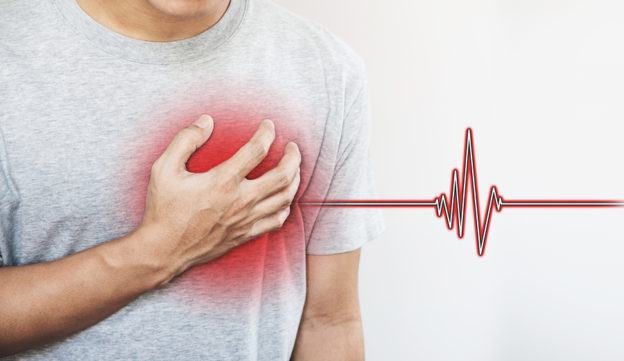By David Blyweiss, M.D., Advanced Natural Wellness
February 13, 2019
The other day I saw R.B. for the first time. The reason she ended up at my clinic was one of those stories I hear all too often.
It turns out her older sister recently suffered a heart attack. No high cholesterol. No high blood pressure or other warning signs. Boom! A heart attack right out of the blue.
Like anyone else would, R.B. decided to do a little internet investigating on her own. That’s where she discovered a large amount of information on a cardiovascular risk factor she had never heard of before. Trimethylamine- N-oxide (TMAO).
She suspected that this might be the cause of her sister’s heart attack. And she wanted to find out if she might be at risk, too. But when she asked to be tested for it, her cardiologist told her the test was worthless.
“Did he give you any hint as to why he thought that?” I asked.
Her answer floored me.
MD Exposes the Hidden Danger to Your Eyes

When your eyesight starts to fail, it's a real problem. Suddenly you can't go to the grocery store... you can't get to the doctor if you have an emergency... you can't meet your friends for dinner…
Your "regular" doctor doesn't have time to keep up with the latest research. And the same goes for eye doctors. They go to school to learn how to fit you for glasses and contacts, but have no way of preventing the damage and loss of eyesight that threatens your freedom and independence.
Let me show you something that explains a LOT about how your eyes work.
In my FREE Special Report, I'll show you a HUGE, untapped resource for your eyes that safely and naturally restores clear, effortless eyesight.
Click here to get started...
The doctor told her there was no treatment for TMAO, so why bother to test for it!
The truth is, these days we’re learning that TMAO is a huge risk factor for cardiovascular disease. Even if you have low cholesterol and low blood pressure like R.B.’s sister, high TMAO levels can indicate high risk of a heart attack or stroke.
And just to be clear on this, many people with high LDL never have a heart attack or stroke in their life. They may not even be at risk for one. Yet a lot of folks with low LDL levels can actually be at very high risk and not even know it.
And by the way… yes! High TMAO is treatable. It’s just not treated with pills and injections.
TMAO: The Surprising Link between Your Gut and Your Heart
When you eat certain foods like red meat, eggs and dairy products, your gut bacteria breaks down the choline, lecithin and carnitine in these foods. This produces a compound that travels to your liver and gets converted to TMAO.
The problem is this.
Higher levels of TMAO are associated with changes in cholesterol metabolism, plaque build-up and narrowing of the arteries, a 23% higher risk of a cardiovascular event and a 55% greater chance of early death.
This is not good news if you’re an avid eater of red meat.
Are You Suffering From...
- Love handles and a pot belly
- Romance that isn't what it used to
- Forgetfulness and inattention
- Low (or no) strength and endurance
- A sex drive that's shifted into neutral...or worse
If so...you may have Mature Male Burnout. Click here to discover more about this unique condition and what you can do about it.
For example, compared to eating white meat like chicken or turkey, a person who eats red meat can have three to 10 times higher levels of TMAO in their bloodstream.
But get this…
When people stop eating red meat, it only takes four weeks to lower levels of TMAO.
And here’s another surprise for you.
There’s a substance found in some foods that can literally shut down the conversion of TMAO.
It’s known as DMB, and it helps to reduce the number of bacteria that produce high levels of TMAO. But not a lot of foods contain it. This very short list includes cold-pressed extra virgin olive oil, balsamic vinegar, red wine and grape seed oil.
These are all staples of the Mediterranean diet, which has been shown to change the composition, diversity and activity of gut microbiota. At the same time, the Mediterranean way of eating doesn’t include a lot of red meat or dairy products.
This may explain why enjoying a Mediterranean style diet is associated with over a 30% lower rate of heart attack, stroke and death from heart-related causes when compared to a reduced fat diet!
It’s surprisingly easy to eat like a Mediterranean. Just load your plate with fresh, organic fruits and vegetables. Use extra virgin olive oil and balsamic vinegar liberally. Add nuts, seeds and beans to your meals. Enjoy a glass of red wine every now and then.
These types of food should account for at least 85% of your daily food intake. You can fill in the remaining 15% (or less) with a rotation of pasture-raised poultry, wild-caught fish and grass-fed meat.
If you’re not entirely sure if the foods you’re eating comply with the Mediterranean way of eating, don’t worry. A few years ago I pulled together a little test that scientists and researchers use to find out how well their study participants are adhering to a Mediterranean style diet. You can check it out here to find out how well you’re doing.
SOURCES:
Velasquez MT, et al. Trimethylamine N-Oxide: The Good, the Bad and the Unknown. Toxins (Basel). 2016 Nov; 8(11): 326.
Qi J, et al. Circulating trimethylamine N‐oxide and the risk of cardiovascular diseases: a systematic review and meta‐analysis of 11 prospective cohort studies. J Cell Mol Med. 2018 Jan; 22(1): 185–194.
Cleveland Clinic Studies Reveal Role of Red Meat in Gut Bacteria, Heart Disease Development. Press release. Cleveland Clinic. 2018.
Wang Z, et al. Impact of chronic dietary red meat, white meat, or non-meat protein on trimethylamine N-oxide metabolism and renal excretion in healthy men and women. European Heart Journal, ehy799.
Wang Z, et al. Non-lethal Inhibition of Gut Microbial Trimethylamine Production for the Treatment of Atherosclerosis. Cell. 2015 Dec 17;163(7):1585-95.
Estruch R, et al. Primary Prevention of Cardiovascular Disease with a Mediterranean Diet Supplemented with Extra-Virgin Olive Oil or Nuts. N Engl J Med. 2018 Jun 21;378(25):e34.
Garcia-Mantrana I, et al. Shifts on Gut Microbiota Associated to Mediterranean Diet Adherence and Specific Dietary Intakes on General Adult Population. Front Microbiol. 2018; 9: 890.







